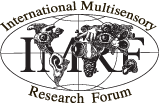‘Visual’-parsing without visual experience: Is 'seeing' with sounds better than sight restoration in the early blind?
Last modified: 2013-05-05
Abstract
Early-blind individuals who regained sight medically in adulthood, demonstrated that functional-vision acquisition in adulthood is challenging. For instance, Ostrovsky et al.1 reported poor behavior in static-visual-parsing (i.e. segregating the image into distinct unified objects), a critical visual concept and an ability required for performing any visual task in natural-environments.
Another rehabilitation approach is to use non-invasive Sensory-Substitution-Devices (SSDs), which transform visual images into sounds. Various abilities were demonstrated using SSDs, however 'visual'-parsing was never directly tested.
Here we tested whether congenitally-blind adults can learn to perform 'visual'-parsing with SSD, using similar stimuli and approach to those used by Ostrovsky et al.1, but this time with the visual information conveyed through sounds; and compared the SSD users' performance to that reported for the medically-sight-restored individuals.
The SSD users performed significantly above chance-level, following only ~ 70 training hours. Interestingly, they outperformed the sight-restored-individuals, who had months of constant eyesight, in all tasks tested. In a second test, we found that the SSD users could discern the vantage-point of 3D objects from 2D SSD images, a task requiring correct parsing (at least in the local-level). Theoretically, the results demonstrate that the adult brain retains visual learning capacity; and suggests that with adequate training and technologies some high-order visual aspects can be acquired in adulthood, even without any visual-experience during developmental critical-periods. Practically, the results support the potential use of SSDs as standalone daily-aids, but also suggest a potential for combining invasive-restoration approaches with SSD input and/or training to improve and enhance rehabilitation.
Another rehabilitation approach is to use non-invasive Sensory-Substitution-Devices (SSDs), which transform visual images into sounds. Various abilities were demonstrated using SSDs, however 'visual'-parsing was never directly tested.
Here we tested whether congenitally-blind adults can learn to perform 'visual'-parsing with SSD, using similar stimuli and approach to those used by Ostrovsky et al.1, but this time with the visual information conveyed through sounds; and compared the SSD users' performance to that reported for the medically-sight-restored individuals.
The SSD users performed significantly above chance-level, following only ~ 70 training hours. Interestingly, they outperformed the sight-restored-individuals, who had months of constant eyesight, in all tasks tested. In a second test, we found that the SSD users could discern the vantage-point of 3D objects from 2D SSD images, a task requiring correct parsing (at least in the local-level). Theoretically, the results demonstrate that the adult brain retains visual learning capacity; and suggests that with adequate training and technologies some high-order visual aspects can be acquired in adulthood, even without any visual-experience during developmental critical-periods. Practically, the results support the potential use of SSDs as standalone daily-aids, but also suggest a potential for combining invasive-restoration approaches with SSD input and/or training to improve and enhance rehabilitation.
References
1) Ostrovsky Y, Meyers E, Ganesh S, Mathur U, Sinha P. Visual Parsing After Recovery From Blindness. Psychological Science 2009; 20 (12): 1484-1491.


